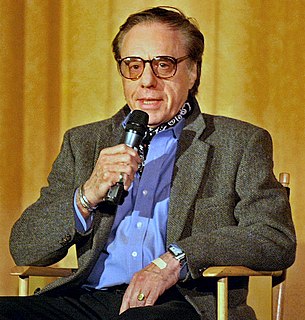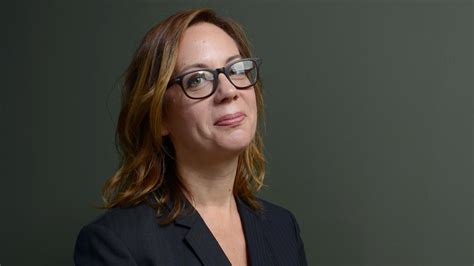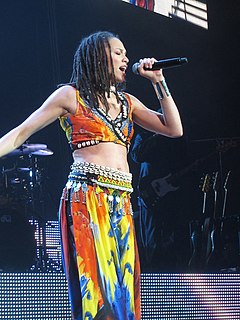A Quote by Peter Bogdanovich
But at a certain point, and I don't really know... people have asked me this. I don't know exactly what it was that pushed me towards directing, but I think it was a naive notion that if I directed I would be able to play all the roles. A kind of greed.
Related Quotes
I think the parts I was offered when I was younger, where I was asked to play that kind of slacker person, that was just because people would go, "Oh, she has dyed black hair." I guess that's how they thought I looked. I played a couple of those roles, and then unfortunately you get pigeonholed really fast, and then you just keep getting asked to do that. And now it would be weird at the age of 46 for me to play a slacker. It would look like I was nuts.
I love the whole kind of notion of transformation for me is (what) excites me about not only acting, but storytelling. I love, I love that notion of a slightly larger-than-life artistic truth, you know, magnifying real emotional truth (or) finding something about human condition (which), you wouldn't necessarily think you can learn from characters such as Kong or Gollum, but actually they are, you know, these huge amplifications of a human psyche and I suppose those kind of roles have always attracted me definitely.
There's a certain level of vehemence, it seems to me, that's directed at me [and] directed at the president. You know, people talking about taking their country back. There's a certain racial component to this for some people. I don't think this is the thing that is a main driver, but for some there's a racial animus.
I think that Anderson Cooper does a great job of staying with stories and pushing them. New Orleans he really... He was there and he pushed it past the point where his producers were saying, "Listen, you've got to stop because people are tuning out now. You know, we're on to another disaster." You know, what do you worry about, Haiti, Chile, Turkey? What? You know where do you put your attention and your focus? So for one person to really be able to cover all that ground would be tough.
I think that you have to have a really specific type of personality to be able to both direct and act, because it requires enormous shifts in perspective. I mean, when you're directing, you're looking at the world through a wide-angle lens, and you're seeing all of it. You know exactly what's happening in every corner of it. You know what people are going to say. You know what they're going to do. You're controlling everything.
What I really intend to achieve is to be that fly on the wall, and to try and observe as much as I can without affecting what I've seen. I want to get a sense that what I'm seeing in a place would have happened had I not be there. Were I to make myself an important presence, that would be lost. The danger of a certain other kind of reporting is that people give you what they think you are seeking. People know what you want. When I was traveling in Congo and Rwanda and people asked me what I wanted, I would say, "Nothing. I just want to be here." And that immediately disarmed them.
It doesn't seem weird to me, at all. I'm in Baton Rouge getting ready to direct a movie for Sony, and I'm in the movie and I'm directing it. I know it's kind of this thing where some people find it difficult. I just finished a movie with Mario Van Peebles and he acted and directed as well too. I think we all feel similar that it just kind of seems natural.
I think that is one of the things that is beautiful about fiction and that you can do through drama. If I was a detective, I could make a certain version of everything we know to be exactly true. And that would have a certain kind of truth value. And there are certain other things that we know that are emotionally true.
There was a great director who directed a picture that I wrote who barred me from the set quite appropriately and said, "I'm sorry, Jim. When you're directing, you don't need to know everything. You need the illusion that you do." And, you know, and I WOULD be there behind him trying to signal the actors in, you know, in a way I wasn't even aware of.






































